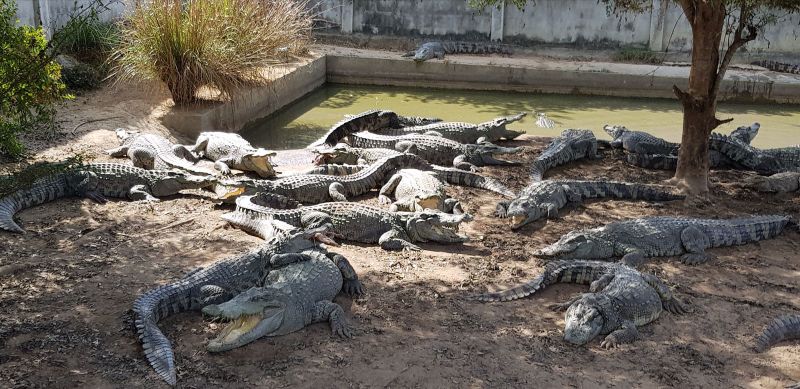A Thai crocodile farmer who goes by the nickname “Crocodile X” said he killed more than 100 critically endangered reptiles to prevent them from escaping after a typhoon damaged their enclosure.
Natthapak Khumkad, 37, who runs a crocodile farm in Lamphun, northern Thailand, said he scrambled to find his Siamese crocodiles a new home when he noticed a wall securing their enclosure was at risk of collapsing. But nowhere was large or secure enough to hold the crocodiles, some of which were up to 4 meters (13 feet) long.
To stop the crocodiles from getting loose into the local community, Natthapak said, he put 125 of them down on September 22.
Typhoon Yagi, Asia’s most powerful storm this year, swept across southern China and Southeast Asia this month, leaving a trail of destruction with its intense rainfall and powerful winds. Downpours inundated Thailand’s north, submerging homes and riverside villages, killing at least nine people.
Storms like Yagi are “getting stronger due to climate change, primarily because warmer ocean waters provide more energy to fuel the storms, leading to increased wind speeds and heavier rainfall,” said Benjamin Horton, director of the Earth Observatory of Singapore.
Natural disasters, including typhoons, pose a range of threats to wildlife, according to the International Fund for Animal Welfare. Flooding can leave animals stranded, in danger of drowning, or separated from their owners or families.
Rain and strong winds can also severely damage habitats and animal shelters. In 2022, Hurricane Ian hit Florida and destroyed the Little Bear Sanctuary in Punta Gorda, leaving 200 animals, including cows, horses, donkeys, pigs and birds without shelter.
The risk of natural disasters to animals is only increasing as human-caused climate change makes extreme weather events more frequent and volatile.
Natthapak said his farm has been open for 17 years and has survived every rainy season until this year, when days of heavy rain eroded the walls of the crocodile tank.
“I had to make a decision in less than 24 hours when I saw the erosion progressed rapidly,” Natthapak said, adding that he electrocuted the crocodiles to kill them.
Pornthip Nualanong, the chief of Lamphun’s fishery office, said Natthapak informed her office as the heavy rains began to threaten the farm.
Killing the crocodiles “was a brave and responsible decision to take, since if any of those grown-up crocs were running loose in nearby paddy fields it would pose (a serious risk to) public safety,” she said.
Among the crocodiles killed was one named Ai Harn, the eldest male breeder and leader of the pack, at 4 meters (13 feet) long.
Videos showed a digger removing the bodies of the crocodiles.
Siamese crocodiles are critically endangered, but they are widely sold and bred in Thailand.
Crocodile farming is a lucrative industry there, with roughly 1,100 registered commercial farms generating between 6 billion and 7 billion Thai baht ($215 million) of revenue annually, Pornthip said.
They were once found across much of Southeast Asia, but hunting and large-scale farming have severely diminished the population of Siamese crocodiles in the wild, with some estimates putting it at just a few hundred.
Earlier this year, 60 Siamese crocodile eggs hatched in Cambodia, the largest recorded breeding event for the species this century.
Natthapak said his family’s original business was selling roasted suckling pigs and calves, but once he noticed how much waste was left over, he decided to use it to feed crocodiles. The family purchased five crocodiles, and the number has grown in the nearly two decades since.
The farm supplies crocodile skins to leather factories, sells frozen meat in Thailand and exports dried crocodile meat to Hong Kong.
He still owns 500 baby crocodiles, which are between 30-120 centimeters (1-4 feet) long.

